new posts in all blogs
Viewing: Blog Posts Tagged with: First Chapter, Most Recent at Top [Help]
Results 1 - 16 of 16
How to use this Page
You are viewing the most recent posts tagged with the words: First Chapter in the JacketFlap blog reader. What is a tag? Think of a tag as a keyword or category label. Tags can both help you find posts on JacketFlap.com as well as provide an easy way for you to "remember" and classify posts for later recall. Try adding a tag yourself by clicking "Add a tag" below a post's header. Scroll down through the list of Recent Posts in the left column and click on a post title that sounds interesting. You can view all posts from a specific blog by clicking the Blog name in the right column, or you can click a 'More Posts from this Blog' link in any individual post.

.
Choosing the right set of words–the diction of your novel–is crucial, especially in the opening pages of your novel. Novels are a context for making choices, and within that context, some words make sense and some don’t.
A novel sets up a certain setting, time period, tone, mood and sensibilities and you must not violate this. If you are writing a gothic romance, the language must reflect this. For thrillers, the fast paced action demands a certain vocabulary. Violating these restrictions means a bump in the reader’s experience that may make them put down the book.
Let’s look at some examples. This is from my book, SAUCY AND BUBBA: A HANSEL AND GRETEL TALE.
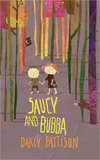 Just from the title you know that this is a contemporary retelling of Hansel and Gretel and this sets up expectations for the language that will be used. This is a first look at Krissy, the stepmother.
Just from the title you know that this is a contemporary retelling of Hansel and Gretel and this sets up expectations for the language that will be used. This is a first look at Krissy, the stepmother.
Krissy was singing to herself. Gingerbread days were filled with music, too. Once a month, Krissy made a gingerbread house and took it into town to sell to the bakery for $200. The bakery displayed it in their picture window for a month, and then donated it to a day care. Each month, Krissy checked out a stack of architecture books and pored over them.
Let’s substitute a couple words and see if it bothers you as a reader:
Krissy was caterwauling to herself. Gingerbread days were crammed with music, too. Once a month, Krissy slapped together a gingerbread house and took it into town to peddle to the bakery for $200. The bakery displayed it in their picture window for a month, and then dumped it off at a day care. Each month, Krissy checked out a stack of architecture books and flipped through them.
I’ve been extreme here in word choice, of course. The key is to listen to your story. Where are the places where a single word might interrupt the narrative? Work hard to control your word choices and the overall diction of your story. And I’ll stay with you for the whole book.


By:
Tonia Allen Gould,
on 9/9/2013
Blog:
Tonia Allen Gould's Blog
(
Login to Add to MyJacketFlap)
JacketFlap tags:
Author Posts,
sample work,
Tonia Allen Gould,
babies making babies,
copyright 2013 Tonia Allen Gould,
lacking education,
Midwestern culture,
first chapter,
novella,
Add a tag
Chapter 1: Babies Making Babies
Babies making babies. Pfft…I ain’t never heard any good story come about when two teenagers set out, ready to conquer the world, only come to find out that they went and got themselves knocked-up after just one night’s fit of passion, leaving all their fancy ideas of what life was gonna be like, splayed like toilet paper on their heels behind them. Mama said that’s precisely what happened to her and Daddy, that they was nothing more than just babies making babies when they gave birth to that stubborn, curly-headed, terror-of-a-sister-of mine, Bartlett.
The way Mama tells it, she met daddy out at the Southern Speedway; the race car track down off Highway 77 in Ardmore, Oklahoma. Mama says that whole night long, Daddy kept trying to kiss her, telling her she sure was the prettiest thing he ever did saw, but Mama told him she was a lady and she was raised better than that. Daddy must have known she wasn’t gonna let any man touch her before she got married, so he up and asked her, straight-away, to marry him on impulse. They didn’t even know each other more than a few hours when my flattered, exasperated mother laughed and looked up at him with her shiny, steel blue eyes and finally gave in to him, “Yes, I’ll marry you, Earl, but not before you go out to my house and ask my Mama and Daddy for permission.”
Mama turned to me, more staring through me than anything, as she slowly recanted that evening so long ago. I watched as something deep within her stirred and fluttered and reared its head, as she began to tell me about that night, talking how they sat on the cold bleachers and watched as those loud, colorful race cars zoomed by them at breakneck speeds while Daddy tried to fondle and flirt with and hear her above the crowd and the noise. I could almost smell the exhaust and the asphalt and rubber, she told the story so well. She said that night she believed she could love my daddy forever. “Barley, your father was the handsomest man in all of Carter County. It’s true, don’t laugh,” she said, eyeing me as I giggled nervously. ”Everyone thought he looked just like Elvis Presley back then, all dark-haired, tall and tan and thin and so confident, your Daddy was. Why, all them girls out at that race track just wished they was me that night,” Mama said, as her smile slowly began to fade. She was suddenly rummaging around in her thoughts, picking them up, one-by-one and ruminating about herself, a different person in a different body at a different time, and for a moment, I thought I had lost her completely to her memories. “Oh Mama, hurry up already. Tell me more,” I finally said, bringing her back to the here and now.
That next Monday morning, Grandpa had his first serious talk with Daddy, the groom-to-be, and gave him what mama called, The Three Nevers Talk. “Never hit her, ever,” my Grandpa said slowly, looking him straight in the eye, taking a long pause for effect, while spitting his tobacco in the Folgers Coffee can he used as a spittoon sitting next to him. I ain’t never hit her and nor should you. Starting up again, grimacing and contemplating his next words, he slowly sucked the tobacco from his teeth he said, “Never let her go hungry, and never stray from her and find yourself another woman, because she’s the best your ever gonna find. Ya hear me? If you can promise me these three things, Anita and me, well…we will give y’all our blessings, and you can marry our Franny,” Grandpa said in a foreboding voice.
Later that morning, my Mama, just fifteen at the time, powdered her skin and got all dressed-up in her Sunday finery, kissed her Mama on the nose, and left the only home she ever knew, all giddy and excited, ambling down a dirt road, heading towards her destiny with a man she barely knew in a dilapidated Chevy truck. Hopeful and reckless with her heart’s out-and-out abandon, she stood solemnly, thinking about what it would be like to be married to the stranger next to her, in front of the Justice of the Peace in the Carter County Courthouse. She married Daddy while my mother’s brother, Uncle John and his wife, June, looked on. Mama never liked old June much, and I could see just mentioning her name gave her the worst case of the willies and that in turn caused the goose pimples to surface on my arm. I brushed them away and finished listening to Mama tell me more about the day she married my daddy.
Nine months after Mama said I do, she gave birth to Bartlett (like the pear), two years and a month before I was born. Mama always had a thing for food, and named me Barley (like the grain.) Seven years later, my baby brother, Graham (like the cracker) came. Us three never knew what hit us, being born a Sullivan. My third grade teacher, Miss Espich, says never knowing what hits you is an idiom relating to very bad consequences in which the people involved were totally unsuspecting. That’s us, the Sullivan Three.


We all know the importance of the first chapter. It must hook the editor and ultimately, the reader, or all is lost. If you don’t pull the reader in with a stunning first chapter, you are sunk.
You can, of course, get thee to a library, where you can sit for lovely hours and read first chapter after first chapter, studying intently as you go. Or, at a retreat in St. Louis this weekend, a writer suggested using samplers.
First you need a Kindle or a FREE Kindle app for the Cloud, iPhone, android phone, iPad, desktop or almost any format you can think of.
Next, search the Kindle store for “sampler,” and you’ll find a host of FREE ebooks that have sample first chapters on a variety of topics. Here are four samplers to start you off.
Be warned! You may find that you simply MUST buy a few of these novels once you read the opening chapters. This could be dangerous to your pocketbook!
Free Ebook Samplers
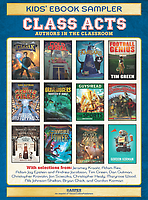
Hunger for Dystopian Teen Sampler
Awesome Adventures for Kids Middle Grade Sampler
Teen Summer Reading Sampler 2012
Class Acts Kids’ Ebook Sampler

By Julie Daines
The 10 Commandments of Writing and When to Break Them
Writing Conferences. We go. We listen. We obey. Maybe sometimes we obey too much.
My next few posts will be about when to break the writing commandments.
Commandment 2:
Thou Shalt Hook the Reader
This commandment is drilled into our heads almost as much as Commandment #1, Show don't tell.
In fact, the internet is overloaded with first line contests, first paragraph contests, and can you hook the reader in 200 words or less?
The truth is, I'm a fairly good reader, and I rarely come across a first 200 words that is impossible to resist, let alone a first line.
Yes, a good hook is important--but it must not be contrived or gimmicky. It must set the stage for the story to come. A hook is meant to attract readers AND let them know what they can expect your story to deliver.
A recent article in Writer's Digest by bestselling author Steven James says,
Too many times a writer will grab reader's attention early on with a scene that's clearly been contrived just for that purpose, without introducing the character or the setting of the story. Consequently the writer is forced to insert excessive backstory into the next scene--thus undermining the forward momentum of the plot. Take your time, trust your readers and craft a hook that orients them to the world you've created. Then drive the story forward without having to explain why you started it the way you did.
James then outlines seven elements of an effective hook:- Grab the reader's attention.
- Introduce a character readers care about.
-
4 Comments on Thou Shalt Hook the Reader, last added: 3/12/2012

The first chapter of "The Canticle Kingdom" is going to be featured on LDSbookcorner.com's First Chapter feature. Sign up at LDSbookcorner.com to try out new books by LDS authors right in your email.
Last week I entered Miss Snark's First Victim's Secret Agent contest (see my entry here) and got some GREAT feedback on my work. Since the contest deals with the first 250 words, all of which I rewrote for the contest, I thought this was a great time to talk about first chapters.
Last summer I attended the Iowa Summer Writing Festival. I took a workshop on first chapters called "Frontloading: The Crucial First Chapter" and the thing I learned that stuck with me the most was that the first chapter is a promise to the reader. It tells them what kind of story they're going to be getting, and what to expect. This is true, even if you don't intend for your first chapter to do that, because it's the way we read. Breaking that promise can frustrate, and disappoint your reader.
That doesn't mean you should give everything away. You don't have to reveal your plot twists, but if your book is a sci-fi thriller, don't let your first chapter read like chick-lit.
By the end of the first chapter, the reader should have some sense of what the main conflict of the book is going to be. They don't need to know all the details, but they should be able to tell the genre, have a good sense of who (what type of person)the main character is, and how their world is changing. Knowing these things sets up anticipation in the reader, it makes them want to read on and see how the events unfold. Not knowing these things makes the reader wonder what the heck this book is about, and if they should even bother to read on and see what happens.
EXAMPLE:
Here's an example of a book with great first chapters:
The Hunger Games - In the first chapter of The Hunger Games we get to see Katniss' everyday world. We learn about the Hunger Games and the Reaping and the high chance that Gale and Katniss will be picked. We see that Katniss is responsible and protective of her sister, Prim, whose name is in the Reaping for the first time. And in the very last sentence of the chapter there's a shock as Prim's name is called. This is a GREAT end of a first chapter. As a reader we are left with a sense of dread. We know what Katniss must do, and we know that we're in for an exciting ride because we're going to experience the Hunger Games with Katniss. We're also introduced to the mechanics of Collin's writing - cliffhanger chapters. Both with story and with structure, she has shown us what to expect, and how to read her book. And she delivers. (Seriously, if you have not read this book yet, go get it NOW.)
Now imagine if The Hunger Games started differently. What if the first chapter was an ordinary day at school for Katniss, followed by time at home dealing with her mother and sister. Suzanne Collins could've started there and gone into greater detail about Katniss' troubled relationship with her mom, given us more history on the District, how life in The Seam works, etc. She could've had the Reaping happen in chapter 3. If she had though, she probably would've lost a lot of readers. I know I would've been flipping back to the cover over and over again, wondering when these supposedly awesome Hunger Games were going to start. I probably would've put the book down before the action started and picked up something else.
The first chapter is the last chapter in disguise.
- Richard PeckI read this quote for the first time not long ago and was struck by how true it was. Richard Peck says that when he finishes his first draft, he always throws out the first chapter without reading it and writes a new one.
I thought about why it is that the first chapter is usually the one that needs the most work and I think I figured out at least part of why this is true.
Usually, at the beginning of a story I am bursting with ideas and information. I know my main char
Today, I get to revise.
I will . . .
- . . . rewrite the opening of a picture book ten different ways. I make my freshman composition students rewrite their openings three ways and always, the later tries are better. This picture book needs that kind of work to get past the cliches for the opening.

- . . . rethink a post for next week on plots. It’s an overview of the methods of plotting,a thoughtful piece that surveys the many books on the topic and makes some generalizations. It needs some filling in and some links and re-thinking to make sure the logic works.
- . . . reread a couple chapter of my novel. Re-reading is the #1 revision activity. Before you can revise, you must re-read. So, I’ll read and think and be ready to make changes next week.

By:
Darcy Pattison,
on 12/11/2008
Blog:
Darcy Pattison's Revision Notes
(
Login to Add to MyJacketFlap)
JacketFlap tags:
openings,
writing techniques,
story plot,
write a novel,
agent,
query,
writing tips,
novel,
agents,
first chapter,
write,
foreshadowing,
opening lines,
Add a tag
The holidays and the end of the year are bringing out the generous nature of agents!
The 2nd Sort-of-Annual Stupendously Ultimate First Paragraph Challenge
- Deadline: 7pm. EST, Thursday, December 11, 2008.
- Who: Literary agent Nathan Bransford, Curtis Brown, San Francisco office
- What: Post the first paragraph of your WIP and compete for the prize of a partial critique, query critique or a 15 minute phone call.
- How: Skip over to Bransford’s website and post your paragraph in the comments.
- Warning: The competition is stiff. With 10 hours left, there were 1176 comments/paragraphs.
- Attention: This is a learning opportunity. Read through at least some of these paragraphs and see which you like and which you don’t. What grabs your attention? Check back when Bransford posts the winners and vote on the finalist. Do you agree with his choices or not? Why or why not?
For more on opening lines:
Take a Holiday Break from Queries and Submit a Chapter Instead
- Dates: December 15 to January 15
- Who: Firebrand Literary
- What: Firebrand agents want to read your first chapter and will forego the usual query. This is a big task for those agents and a great opportunity for writers of all kinds. For those of you who have never got a request for a partial (probably because your query was weak), this is your golden chance. Let your writing speak for itself.
- How: Go to the Query Holiday posting on Firebrand’s website.
For more on opening chapters:

Attack of the Growling Eyeballs by Lin Oliver, illustrated by Stephen Gilpin
Feeling picked-on and underappreciated in your own family? Surrounded by people who don't understand you? What you need is a one-inch-tall identical twin brother. Really!
Daniel lives with his three sisters, his mom, his grandmother, and his great-grandmother, and he feels a little overlooked. One day, he shrinks to the size of his fourth toe. Yes, he does. He grows back to normal size, though. Perplexed to say the least, he turns to his great grandmother, Granny Nanny, who reveals that the tendency to shrink is a well-kept and little-understood family secret. Another secret is Pablo, his twin, whom even his mother has never known about. Granny has been raising Pablo in secret all these years. She suspects it's her goulash that makes people shrink.
Pablo, or "The Pablo" as he calls himself, is The Bomb. Nobody can hear him, so he is free to make wisecracks about the women of the house. He can give voice to the opinions and comments that Daniel would get SO beat up for. He can pick and choose what he wants to learn about - Granny homeschools him, but he hitches a ride to school with Daniel whenever Daniel's class is studying something interesting. Pablo can watch TV in the daytime. Pablo has lots of good ideas about how to have fun.
This is a super-funny, super-cool book for kids at about a 3rd grade reading level. The illustrations are slouchy and hip, and the cover is a can't-miss. So glad it's a series!
The Giggler Treatment by Roddy Doyle
Your Neighborhood Librarian: Dude, thanks for reading this book to me in the car.
Prosper: You're welcome.
YNL: What did you like about The Giggler Treatment?
P: I don't know. I just liked it. It was funny.
YNL: Talking seagull?
P: Yeah! That was funny, and the Gigglers, they were funny.
YNL: Anything unusual about this book?
P: Well, there was a lot of poo in it.
YNL: And that's unusual?
P: Yes!
YNL: How about the questions?
P: That was unusual. It was like someone else was reading the book.
YNL: And asking the author questions?
P: Yeah! And he was always like, "Good question!"
P: And I liked the talking biscuits, the one was like, "When you put your feet in water, when you take them back out, they are wet! Isn't that interesting?"
YNL: That was funny. Because, like...
P: It's not!
YNL: We were driving, so I didn't notice it has illustrations til now. Are they just, like, decoration, or do they tell you about what's going on?
P: They don't tell you what's going on, but you can see what people look like.
YNL: What kind of kid would you recommend The Giggler Treatment to?
P: My friend [Titan], because he really likes funny books.
YNL: Thanks, man. Can I take your picture with that book?
P: I guess.
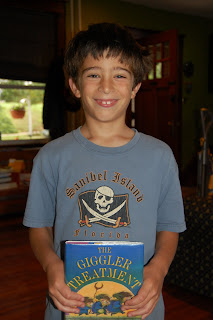
Prosper is seven and will be entering 2nd grade in a month. He also likes funny chapter books like Sideways Stories from Wayside School and detective chapter books like Encyclopedia Brown
and detective chapter books like Encyclopedia Brown .
.
I would leave this review entirely to him, except I really have to note that the entire book takes place during the time it takes a man to walk four steps toward a giant pile of wet dog crap. Plus there's quite a lot of back-chat from an imaginary reader. Altogether Joycean, Proustian, Pynchonesque - name some other authors completely inappropriate for seven year olds and slap adjectival suffixes onto them - but funny (Ok, funny-er, if you, like four other people on the planet, thought Gravity's Rainbow was really a stitch).
was really a stitch).
This jaunty little first chapter book came my way courtesy Betsy Bird at Fuse #8. Every now and then she jettisons some excess ARCs, and I was lucky enough to snag one this time around.
Here's the old underdog-saves-the-day story with a new angle: Medusa, a gorgon, with the requisite snaky hair and reputation for petrification, and her pals Chiron the centaur and Mino the minotaur are picked on at school by The Champions, shiny shiny hero kids named Perseus, Theseus, and, oddly, Cassandra (presumedly pre-curse).
Teasing, name-calling, etc. A hat is snatched off and thrown in the gutter. Then the three freak kids have to go on an unsupervised camping trip with the hero kids, and, what do you know, by using their skills together, the monster kids save the jerky trio of champions and return to Athens big heroes.
Then Medusa turns The Champions to stone anyway, which actually sounds more satisfying here than it does in the book. In the book, her parents are very big on self-control, and you're led to feel proud of Medusa for exercising hers, so it comes as something of a surprise that she blows it at the end. I'm guessing that the author is setting up a conflict for future books.
My sixth-grade friend Alice, admittedly a little old for this book, read it and said, "Meh." I'm inclined to agree. However, the kids that lap up anything to do with Greek gods and heros will accept this book. And I won't hold it against Ross Collins. I adore his illustration style: it's like Marla Frazee with attitude. And Alvie Eats Soup and Supposing
and Supposing are marvelous books, and I'm hoping to get my hands on Germs
are marvelous books, and I'm hoping to get my hands on Germs sometime soon. Wait, no. Oh, you know what I mean.
sometime soon. Wait, no. Oh, you know what I mean.
Yes, my novel writing is continuing along. This was not the best of weeks for volume, but was decent for story structure, so yay! I'm at 38,780 words this week. I will be gone next week, so I won't be posting again until March 14, 2008.
This week I'm going to chat about first chapters. They are difficult to write, but I have a thought or two about how to make them happen well.
Don't be afraid of developing a setting. Be lavish in your description. I like to throw everything in at first. I give myself permission to be untamed and uninhibited in that first chapter, understanding at some point I will have to go through the entire thing at least dozens of times, refining and polishing.
I approach each first chapter from any angle. I open up to possibilities of shifting the voice, tense, and POV. This is where I pull out my mad skills. I find that a first chapter is not the place for a faint heart. Spin your tale out; believe you have a miraculous ability like a spider. Know you are able to cast out a web, though it starts as one thread after another, in the morning light, drenched by dew, it is a miracle to all that behold it.
Let every voice you've ever heard cheer you on. Be mad, fierce, fearless. Be willing to throw it all out and start again. The first chapter is the place to celebrate, anticipate, and conjure up that which is to come. This is the time to believe in magic, luck, angels, heaven, hell, hope, despair, just throw it all in, the more the better.
Here is the place that faith is born. Your words will create in your readers an unstoppable hunger, vision and passion; respect this with your whole heart. If you do these things, you will find your way. You will say, “This is what I meant to say.”
From Psalm 20, verse 5: We will shout for joy when you are victorious. . .
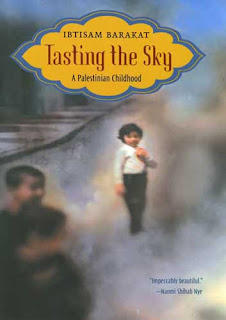
Barakat, Ibtisam. 2007. Tasting the Sky: A Palestinian Childhood.
In this memoir, Ibtisam Barakat provides a framework for sharing her powerful and emotional story. The frame of the story is 1981. As a young woman, a teen, her bus is stopped by Israeli soldiers. The passengers are taken by the soldiers and interrogated before they are finally released to go to their destination: Ramallah.
From the very beginning, her narrative hooks the reader with its simple yet powerful style:
Birzeit is where students go to college after finishing high school in Ramallah. Some also come from Gaza, Nablus, and other cities, towns, and refugee camps. In Birzeit, many students become active in politics and have fights with the Israeli army. They chant on the streets that they want freedom from the occupation. But I did not go there to chant for freedom. I have my freedom. It is hidden in Post Office Box 34. This is what takes me from Ramallah to Birzeit.
Post Office 34 is the only place in the world that belongs to me. It belonged to my brother Basel first. He left Ramalllah and did not want to give up the box, so he passed it on to me. On the days I don’t go to Birzeit, I bury the key in the dirt under a lemon tree near our house. If I die, the key for the box will be under the ground with me.
Having this box is like having a country, the size of a tiny square, all to myself. I love to go there, dig the key out of my pocket, turn its neck around, open the door, then slowly let my hand nestle in and linger, even if the box is empty. I wish I could open my postbox every day. I feel that my hand, when deep inside it, reaches out to anyone on the other side of the world who wants to be my friend. (8-9)
My true journal is written with no pen or paper, but in my mind, with an invisible hand in the air. No one will ever find it (12)
Tears are my secret ink, in the absence of real ink. Liquid stories. (14-15)
She continues on by saying that her many pen pals world wide are always curious about her childhood. But that up until now, she’s lived by her mother’s motto that it is better to forget the past. To forget the atrocities. To forget the fear. To forget the nightmares. But our narrator is coming to a time and place in her life where she wants to remember...needs to remember.
And thus begins the second part of our story. This second part begins on the first day of the six-day war. As a young girl (maybe three year old), her world is turned completely upside down one day when their father brings home news of the war. After a few panicked hours in a water trench in their garden, the family decides to flee their home and join the throngs of rushing refugees that are trying to reach Jordan. The family rushes to their home, takes a few belongings, and the children are ordered to put on their shoes and be ready to go right then. But this poor little girl, she is unable to lace her shoes. And she could only find one.
Initially separated by her family by the rushing crowds, Ibtisam manages to find her family later that day among the crowds. Now no matter what happens, they’ll survive or die as a family all together.
The second part of the book covers the years 1967 to 1971. It covers the war, the year or so spent as a refugee in Jordan, their return to Ramallah and the rebuilding of their homes, the continuing fear of living in a “occupied” region, and the knowledge that set a young girl free: the power to read and write.
She then returns to the frame story, 1981, and shares how telling her story has been self-empowering. And how she is no longer afraid to share with others the traumas of her past.
Like a bird flinging
Its freedom songs
Across the sky
The small girl
I once was
Sings out this story.
I see her smile. (168)
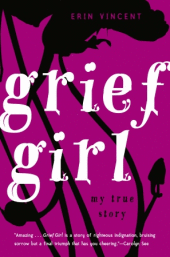
Vincent, Erin. 2007. Grief Girl: My True Story
Erin Vincent suffered great loss as a young teen--the loss of both of her parents.
I am just like you.
I get bored in school.
I goof off with my friends.
I fight with my family.
I have big dreams.
I am just like anyone else.
And then, in a split second, I'm not.
This is my story
It is a coming-of-age in the midst of grief story. It tells how Erin and her older sister, Tracy, and her baby brother, Trent, deal with the loss of their parents. How their lives change and don't change. It begins in 1983 and concludes in 1986. It's about family. It's about friendships. It's about first jobs. It's about growing up and finding yourself.
It is an emotional book. There are highs and lows in her journey to adulthood. And there are places along the way that are difficult to read about. But overall, I think it is a well written book that many will enjoy reading.
We get sent ugly flowers. The kind you only send to dead people because no one living should have to look at such crap. The house is full of unattractive carnations. Vases of flowers line Dad's bar...They're laughing at me. I'm living in a funeral home. (43)
http://www.griefgirl.com/
I'm enough of a Luddite that I found it more than a bit disconcerting earlier today, when bringing up the Amazon website to look at a book, to find the main page welcoming me with "Science Picks for Becky". But disconcertedness turned to intrigue when the first cover's illustration, and then its title, caught my eye: Little Heathens: Hard Times and High Spirits on an Iowa Farm During the Great
 What have we done to reality?
What have we done to reality?
In a publishing market flooded with memoirs, our relationship with fiction and non-fiction is dissolving. I say open the floodgates and let our narrators be swamped with our news, ideas, and personality quirks.
If you are thinking about writing a memoir, I have three dispatches from the front lines of the Battle for Reality--thoughts to consider as you shape your own story.
1- Writing too close to reality can be dangerous. Literary Saloon reports on a French writer attacked by farmers for the way he portrayed their village in a novel. The Saloon adds this observation to the original article: "Physical attacks are, of course, beyond the pale, but obviously this continues to be an author's dream: the publicity seems to be doing wonders for Jourde's book -- get your own copy at Amazon.fr, where its ranking was 23 last we checked."
2- The bloggers, critics, and readers who demand objective truth from writers writing about real life may be hurting literature. Ed Champion explores two faux memoirs in this essay, asking why contemporary readers insist that memoirs be held to the same standard as journalism--outlining a writing debate that our kids will study in college some day.
3- No matter where you stand on the Battle for Reality, don't sign a movie contract as a fake author. GalleyCat discusses here. And, as a bonus, Danielle Trussoni has some memoir writing tips here. What do you think? How should we write about reality?

 Just from the title you know that this is a contemporary retelling of Hansel and Gretel and this sets up expectations for the language that will be used. This is a first look at Krissy, the stepmother.
Just from the title you know that this is a contemporary retelling of Hansel and Gretel and this sets up expectations for the language that will be used. This is a first look at Krissy, the stepmother.





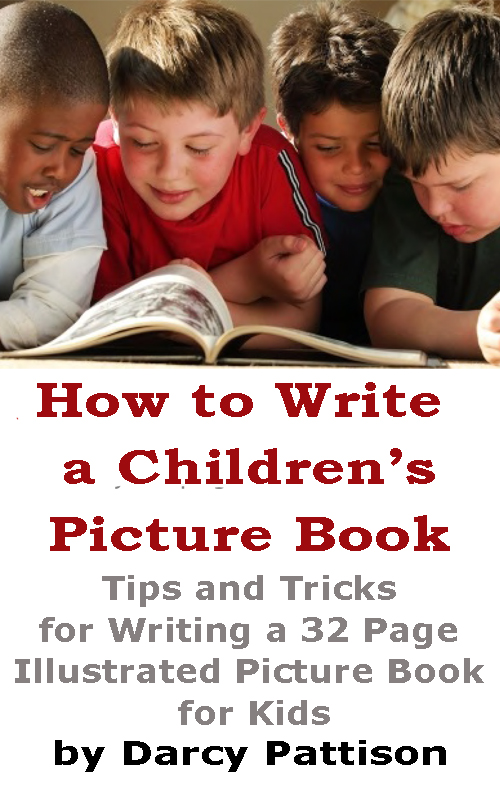





I want to read more, I wonder what happened next. Nice writing style.
nice…. I want to read more.
Thanks, Donald! I was halfway through writing a novel with an adult, narrative voice and I wasn’t having any fun with it, and let it go dormant. An agent friend suggested I switch the voice to a child, and rewrite the story for the young adult market. Suddenly, it’s taking life, but it’s a complete rewrite. Could take a while!
This book will be a winner! I know just a few tiny sentences that may be in this story and I can’t wait to hear how you put them into words on a page!
Thanks for your enthusiasm, Janet. I’m just writing and doing some fair edits as this point. Next up, plot, character development, struggle, etc. That’s the hard work. By the way, Chapter 2 is now also up here. Check it out!